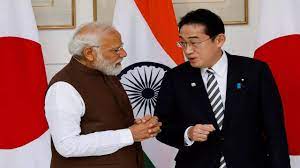With skillfully chosen words, EAM Jaishankar has conveyed that Japan needs to let go of its historical legacies in order to be ready to engage with the emerging India.
New Delhi: During his three-day visit there from March 6–8, External Affairs Minister S. Jaishankar identified Japan and India as natural allies. In order to counterbalance the world against authoritarian China, Japan, Australia, and the US are QUAD partners with India.
While EAM Jaishankar and his Japanese counterpart Yoko Kamikawa will be engaging in a strategic dialogue, the Indian Minister has made it clear through his carefully chosen wording that Japan needs to let go of its historical legacies in order to be ready to deal with the new India. In other words, if Japan acts like a transactional power and does not share cutting edge technology with its quad partner, the two nations will need to come up with new ground rules and their bilateral relationship will come to a standstill.
Despite the fact that Japanese automakers have been present in India for the last 25 years, the country’s overall automobile export revenue has not surpassed USD 5 billion. When you consider that in 2022–2023, Apple exported iPhones valued at almost ₹65000 crore from its one lakh mobile manufacturing facilities in India, the overall picture becomes even more evident.

The Fumio Kishida administration is still hedging its bets on Beijing despite the fact that both Japan and India are directly confronted by an expanding China, and that Moscow is putting more pressure on Tokyo. Japan’s pacifist philosophy is becoming a significant obstacle to India-Japan defense cooperation. Another obstacle is Japan’s reluctance to give India technology, particularly in light of PM Modi’s commitment to the “Make in India” initiative to establish India as a global economic and military power.
The agreement to buy 12 amphibious search and rescue aircraft from Tokyo was nevertheless made possible by the operational restrictions set by Japanese leadership because of Japan’s reluctance to share technology and its strict policies on the transfer of military platforms to India.
Through technological transfer from Japan, India is now interested in producing unicorn antennas and submarines powered by lithium ion batteries for the Indian Navy. Although the Japanese military leadership has expressed great interest in the Indian proposal at the highest level, it is clear that Tokyo is reluctant to share cutting edge technology, even when it comes to direct government-to-government acquisitions.
The lithium battery submarines are significantly more operationally superior to the standard diesel-electric submarine and the advanced independent propulsion submarine, as they extend the submarines’ underwater endurance and improve operational efficiency through faster battery charging. The unicorn antennas further enhance the stealth of warships.
India views Japan as a crucial ally in its development into a prosperous country. However, Japan needs to acknowledge that India has changed during the past ten years.

